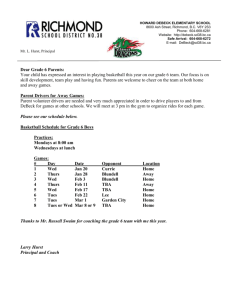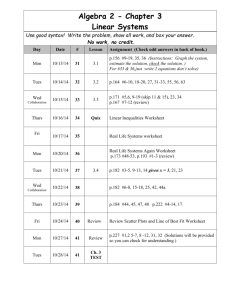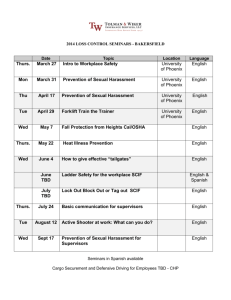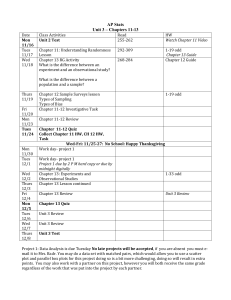Spring 2011 - Donald Bren School of Information and Computer
advertisement
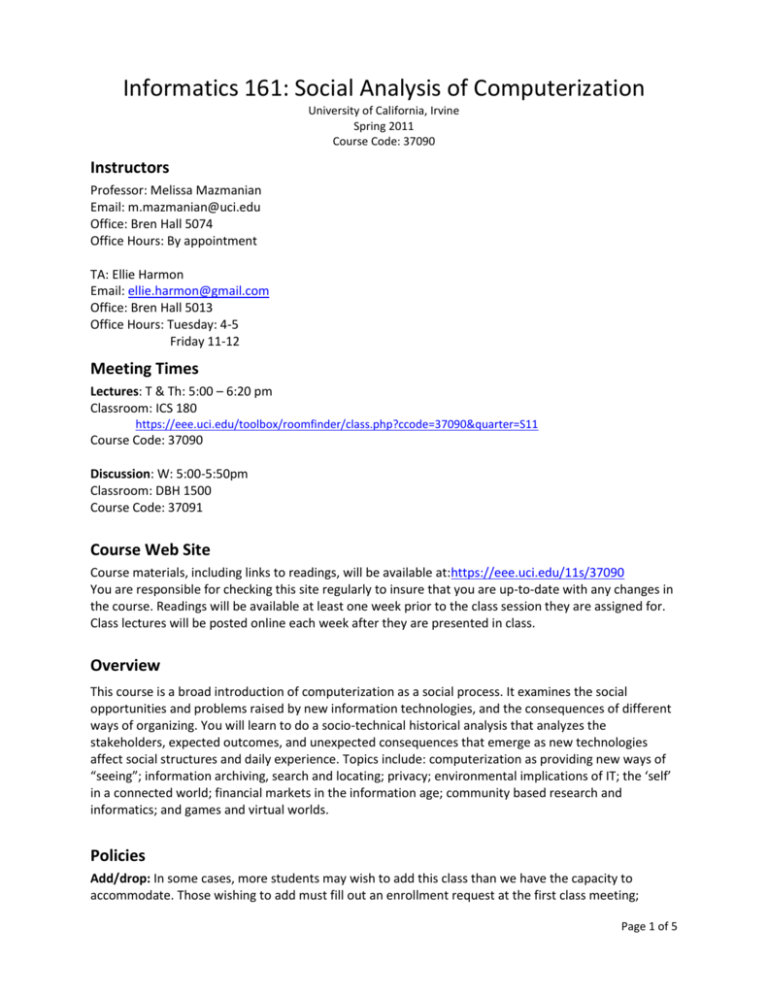
Informatics 161: Social Analysis of Computerization University of California, Irvine Spring 2011 Course Code: 37090 Instructors Professor: Melissa Mazmanian Email: m.mazmanian@uci.edu Office: Bren Hall 5074 Office Hours: By appointment TA: Ellie Harmon Email: ellie.harmon@gmail.com Office: Bren Hall 5013 Office Hours: Tuesday: 4-5 Friday 11-12 Meeting Times Lectures: T & Th: 5:00 – 6:20 pm Classroom: ICS 180 https://eee.uci.edu/toolbox/roomfinder/class.php?ccode=37090&quarter=S11 Course Code: 37090 Discussion: W: 5:00-5:50pm Classroom: DBH 1500 Course Code: 37091 Course Web Site Course materials, including links to readings, will be available at:https://eee.uci.edu/11s/37090 You are responsible for checking this site regularly to insure that you are up-to-date with any changes in the course. Readings will be available at least one week prior to the class session they are assigned for. Class lectures will be posted online each week after they are presented in class. Overview This course is a broad introduction of computerization as a social process. It examines the social opportunities and problems raised by new information technologies, and the consequences of different ways of organizing. You will learn to do a socio-technical historical analysis that analyzes the stakeholders, expected outcomes, and unexpected consequences that emerge as new technologies affect social structures and daily experience. Topics include: computerization as providing new ways of “seeing”; information archiving, search and locating; privacy; environmental implications of IT; the ‘self’ in a connected world; financial markets in the information age; community based research and informatics; and games and virtual worlds. Policies Add/drop: In some cases, more students may wish to add this class than we have the capacity to accommodate. Those wishing to add must fill out an enrollment request at the first class meeting; Page 1 of 5 following departmental and university guidelines, we will establish priorities for filling any seats that become available. Because a student who is enrolled occupies a seat that other students want, ICS does not allow students to drop after it's too late for another student to fill that seat. Specifically, if you wish to drop the class, you must do so by the beginning of class on Thursday, April 7 or sooner. Attendance: Attendance in class is mandatory. Every class missed will result in an automatic loss of 3 points (approximately ½ of a final grade in the course). If you need to miss class for extenuating circumstances I expect you to contact me at least one day ahead of class. Except for illness or emergency any absences reported to me on the day of class will be counted as unaccepted. Discussion sections are mandatory for the three weeks prior to your group presentation. Attendance will be taken by the TA for the three weeks prior to your group presentation. Attendance in these discussion sections and contributing to your group project are 50% of your group project grade. You are invited to attend discussion sessions beyond the specified three weeks if you would like to discuss topics or readings or feel that you would benefit from interaction with the TA. If a section will not be held in a given week, it will be announced by email or in class no later than Thursday of the previous week. Respect: This class involves significant in-class discussion of topics on which you and your classmates may have differences in opinion. Please be respectful of others at all times. Academic honesty: Please familiarize yourself with the latest UCI academic honesty policy: http://www.editor.uci.edu/catalogue/appx/appx.2.htm. All papers will be turned in using the service turnitin.com. Any episodes of plagiarism in the final paper will result in an automatic F for the entire class (regardless of your past work in the course). If group reports have any plagiarized content EACH PERSON in the group will receive an automatic zero for the group project. Technology in class: Please turn off all cell phones/pagers/etc. before the beginning of each class. Please do not use notebook computers during class for any purpose not directly relating to this class. Please do not instant message or check email during class. We will be circulating and we WILL ask you to close your computer or put away your phone. We appreciate not being put in that position. I find using technologies while in class extremely rude. If I sense that people are becoming distracted by facebook, email, games etc. I will prohibit all use of technology in the classroom I have made sure that your guest lecturers are interesting, engaging, and knowledgeable. They are all doing us a favor by visiting the class. If you use technologies to distract yourself while we have a guest lecturer I will automatically deduct 3 points from your final grade. Correspondence: We will send course announcements by email to the official course mailing list, so you should check your email regularly. Note that this mailing list goes to the email address that the registrar has for you (your UCInet ID). If you prefer to read your email on another account, you should set your UCInet account to forward your Email to your preferred account (you can do this on the web at http://phwww.cwis.uci.edu/cgi-bin/phupdate). Assignments: All written assignments should use standard formatting – Times style font size 12 or Arial/Tahoma style font size 10, 8.5x11in. paper, 1” margins. Final papers will be turned in digitally via turnitin.com. Page 2 of 5 Total Points 98 - 100 94 - 97 91 - 93 88 - 90 84 - 87 81 - 83 78 - 80 74 - 77 71 - 73 68 - 70 64 - 67 61 - 63 60 and below Grade A+ A AB+ B BC+ C CD+ D DFail Late Assignments: Papers that are received after 8am will have their grades reduced by half a grade point. Papers more than one day late will not be accepted. Course Mechanics and Grading Grading (Items Explained Below) Reading Summaries: 30% Group Project: 30% Final Paper: 30% Class participation: 10% Total = 100 points Basis of Lecture/Course Materials: For each lecture there will be 2 articles identified and some or all will be discussed in class. All of the articles will be available electronically. You should read the articles before coming to class on the day that they are listed. Readings can be downloaded from the course website. Reading Summaries: Regularly at the beginning of class you will be asked to answer questions about the readings assigned for that day. Three questions will be asked about each reading: 2) What do you think the author is most concerned about? OR What are you most concerned about after reading this piece? 3) What do you think the author is most optimistic/excited about? OR What are you most optimistic/excited about after reading this piece? These assignments will each count for up to 3 points: 1 point for writing your name at the top of the paper (an attendance check), and 1 pt for each reading assigned. If only one reading is assigned up to two points will be awarded to your summary depending on quality of the summary. Be careful, these points add up to a significant part of your grade. On any given class day, you may choose to turn in a written summary that you have written and printed prior to class. You need to show up with a printed-paper with your summaries and your name hand written on the top. You cannot turn summaries in via email. Page 3 of 5 Group project/final paper: You will participate in a group project that explores a relevant event or issue that is currently in the news. Your final paper will involve expanding on an issue presented by a different group. Details will be discussed in class. Final papers will be turned through turnitin.com by 8am on Monday, June 6. Class Participation: We strongly encourage you to participate in class discussion. This is an interactive course that relies on the viewpoints and interests of a variety of students to be interesting. Your participation grade will reflect your willingness to speak up with constructive and interesting comments. If you have difficulty speaking in class please come speak with the instructor privately within the first three weeks of class. Note These are guidelines intended to help students plan their work in this course. However, the instructor reserves the right to make changes to this syllabus over the course of the quarter. SCHEUDLE Class Date Lecture: Tues, March 29 Discussion: Wed, March 30 Lecture: Thurs, March 31 Lecture: Tues, April 5 Topic Introduction NO DISCUSSION What is a “socio-technical” analysis? Technology as altering humanity Readings Ray Bradbury, “The Murderer” Tom Standage, selections from “The Victorian Internet” Chapters 1, 7, & 8 Postman, N, "The Surrender of Culture to Technology" Chapters 1 & 8 Assignment Reading summaries Sarewitz, D. The Science of Happiness Discussion: Wed, April 6 Lecture: Thurs, April 7 Lecture: Tues, April 12 Discussion: Wed, April 13 Lecture: Thurs, April 14 Lecture: Tues, April 19 Mandatory groups 1 & 2 Computation as a new ways of seeing? What is the “social” in social networking? Mandatory groups 1, 2, 3, 4 Objects and Information: Archiving, searching, locating New forms of work TBD Reading summaries TBD Reading summaries TBD Reading summaries Reading summaries TBD Discussion: Wed, April 20 Lecture: Thurs, April 21 Mandatory groups 1, 2, 3, 4, 5, 6 GROUP 1 & 2 PRESENT Lecture: Tues, April 26 Guest Lecture – Paul Dourish Privacy in the information age Mandatory groups 3, 4, 5, 6, 7, 8 GROUP 3 & 4 PRESENT TBD Wired self TBD Mandatory groups 5, 6, 7, 8 Guest Lecture – Bill Tomlinson Title: IT and (Un)sustainable Cultures Tomlinson, et. al, “Can More Efficient IT Be Worse for the Environment.” Discussion: Wed, April 27 Lecture: Thurs, April 28 Lecture: Tues, May 3 Discussion: Wed, May 4 Lecture: Thurs, May 5 Group Presentations Group Presentations Reading summaries Page 4 of 5 Tomlinson, IT and (Un)sustainable Cultures Lecture: Tues, May 10 Discussion: Wed, May 11 Lecture: Thurs, May 12 Lecture: Tues, May 17 GROUP 5 & 6 PRESENT Group Presentations Mandatory groups 7, 8, 9, 10 GROUP 7 & 8 PRESENT Financial markets TBD Lecture: Tues, May 24 Mandatory groups 9, 10, 11, 12 Guest Lecture – Gillian Hayes Community Based Research and Informatics Virtual worlds and games Hayes, “The Relationship of Action Research to Human Computer Interaction.” TBD Discussion: Wed, May 25 Lecture: Thurs, May 26 Mandatory groups 9, 10, 11, 12 GROUP 9 & 10 PRESENT Discussion: Wed, May 18 Lecture: Thurs, May 19 Lecture: Tues, May 31 Discussion: Wed, June 1 Lecture: Thurs, June 2 Mon: June 6 Robotics and humanity TBD Group Presentations Reading summaries Reading summaries Reading summaries Group Presentations Reading summaries Mandatory groups 11 & 12 GROUP 11 & 12 FINAL PAPER DUE by 8am Page 5 of 5


